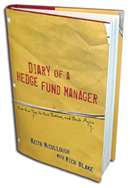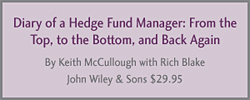Diary of a Hedge Fund Manager" is really an amazing story. Through hard work, a middle-class kid from Thunder Bay, Ontario earns a hockey scholarship to Yale University, gets a job in equity sales at Credit Suisse during the height of the dot.com craze and moves to a hedge fund as a junior analyst within a year. Three years later he is earning more than
$1 million a year as a portfolio manager.
Author Keith McCullough’s book covers a time in Wall Street history that still staggers the mind, a period when the United States went from one era of excess to another–from the Internet to the housing bubble. One byproduct of the times was the hedge fund bubble, which McCullough admits he benefited from.
The mania and froth of the times were so great and blinding, that at one point, after McCullough reaches seven figures in annual compensation, he recounts how he reset his next goal to $10 million a year. Not bad ambitions for a 27-year-old. McCullough admits that luck played a role in his meteoric rise, but there was also hard work and design, he says–he kept his edge by writing a daily journal of various indices and economic figures that he memorized. This helped him spot trends in the market.
With the help of Rich Blake, a veteran Wall Street journalist with a thick Rolodex, McCullough takes the reader through his brief, but successful career in hedge funds. By fall of 2007, when at the wizened age of about 31, it was all over–McCullough would be gone from the hedge fund industry for good. He lost his job at Carlyle-Blue Wave Partners because he was bearish too soon.


"Diary of a Hedge Fund Manager" is an easy read. It offers context about the hedge fund industry and hedge funds’ role in the financial crisis. It demonstrates the growth of hedge funds with facts and figures. It also gives a quick history of the business, while reciting the litany of past and present-day superstar managers. The book accomplishes its goal: It explains hedge funds through the eyes of a former manager.
This is not a tell-all book–far from it. It is one man’s story. You won’t find any stories about individual hedge fund managers by name–except for "the Giant." He is an anonymous fat-cat manager whom McCullough sees on a flight stuffing his face with caviar while McCullough pores over reports.
The shortage of stories might be chalked up to McCullough spending long days researching his investments–in the office by 5 a.m. and on the road constantly for company meetings.
Who Else Owns It?
McCullough’s one major annoyance with the hedge fund industry is that these "secretive" managers weren’t so secretive with each other. They often operated in a herd mentality. One thing his bosses always wanted to know was who else had invested in the same stock.
That was particularly the case if a position was going against him. But portfolio managers yapping to colleagues on the Street is nothing new–leakage about a new position can also come from the stock picker himself.
Wall Street pros aren’t going to learn much about the hedge fund business in this book, although the information is well organized. But the book does offer the financial professional the chance to reminisce and to compare personal notes and experiences during the period.
No one is expecting the next "Liar’s Poker," but the book does suffer from a shortage of anecdotes and stories. Because this is one person’s story, maybe it can be forgiven. But Wall Street is a colorful place, and the lack of stories that provide insight into the business is a huge missed opportunity.
In one instance, McCullough begins to compare equity research salesmen to sales traders. He writes that equity sales traders "are a different species of Wall Street animals than my brethren in equity sales." There is no further explanation or amplification of what he means by "animals." No short anecdote to reward the reader about the people or any trading desk shenanigans. The reader does, however, get a nuts-and-bolts explanation of how a trading desk works with research.
The book appears to be aimed at a mass audience, the curious retail investor who has an interest in hedge funds. McCullough does provide his investment philosophy on a basic level, which feels appropriate for this book. (It’s value with a catalyst, by the way.) One piece of advice he offers to readers is to take greater control of their investments.
Other than seeing McCullough as a hard worker who is ultra-competitive, the reader does not get a feel for him as a person. One doesn’t find oneself rooting for or against him throughout the 208 pages. And again, the big shortcoming of the book is that there is little color about people–including the author and the folks he worked with.
No Personalities
That also includes his partner. When McCullough has the opportunity to leave one shop for another firm, he asks himself what is more important–money or loyalty to his partner? He chooses money, which in a business about absolute returns is nothing to be ashamed of. But other than a name, the reader has no insight into or understanding about his partner or their relationship, only that McCullough says it was a difficult decision. Should he have stayed or gone? It’s difficult to care either way if the reader has no feel for either person. Photos would have helped a reader to better identify with the author and maybe a shot or two of his notebook journal to see his work.
After McCullough was let go at Blue Wave, he started writing a daily blog that charted his market calls. And wouldn’t you know, he had the financial crisis pegged. He talked about getting hate mail from leveraged hedge fund "friends," whose bullish bets began to go against them. McCullough’s "paper" portfolio outstripped the market, which paper portfolios often do. Wanting to get back to his process of stock selection, using a macro overlay, McCullough eventually decided to form his own research firm called Research Edge.
Wanting to be as transparent and independent as possible, when the firm was founded, McCullough decided that his firm would take only checks as payment, since it had no brokerage arm. Later on reality set in, and a few pages later, readers are treated to this innocuous tidbit: Research Edge just forged a relationship with LaBranche & Co.’s institutional arm to get paid via commissions.
Wall Street pros would be well served to give "Diary of a Hedge Fund Manager" to friends and relatives to answer those age-old nagging questions about how the Street and hedge funds operate. If you do, however, be prepared to be asked, "Why didn’t you make a million dollars a year when you first started on Wall Street?"
(c) 2010 Traders Magazine and SourceMedia, Inc. All Rights Reserved.
http://www.tradersmagazine.com http://www.sourcemedia.com/




